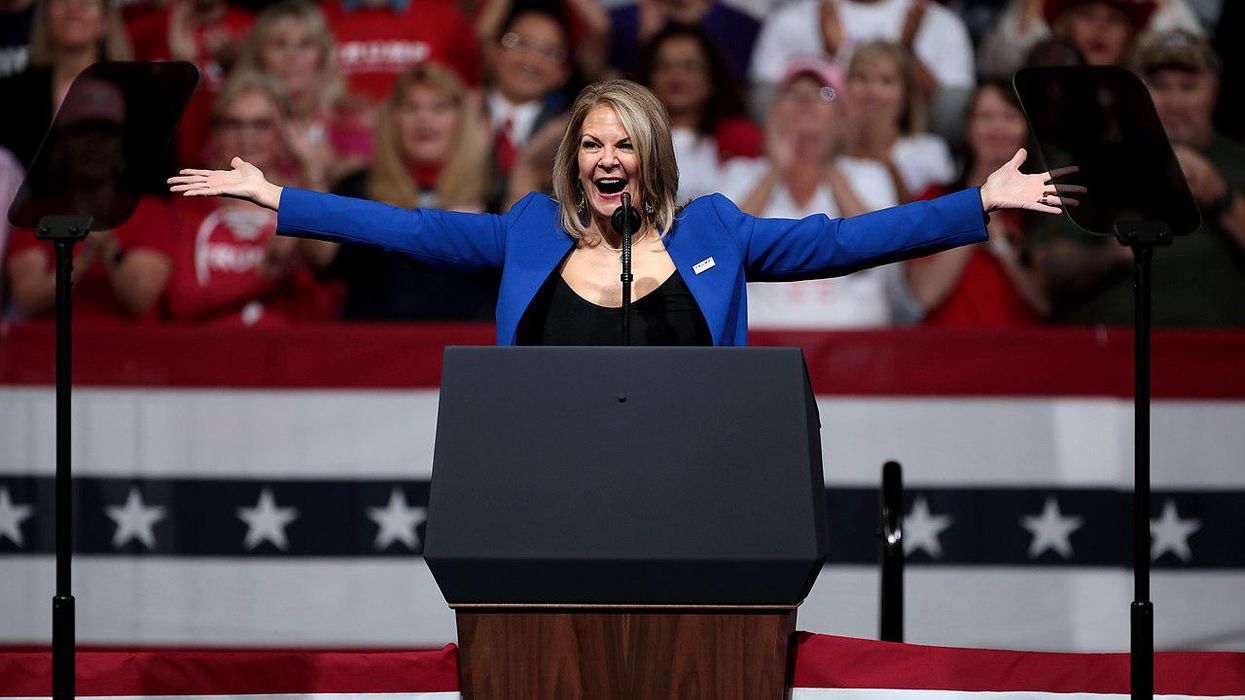Case against Arizona's fake electors plows ahead— despite Trump's intervention

Arizona Republican Party Chair Kelli Ward speaking at a MAGA in Phoenix in February 2020, Gage Skidmore
November 11, 2025 | 07:03AM ETBank
President Donald Trump pardoned Arizona’s “fake electors” over the weekend along with a number of other high-profile supporters who spread election misinformation and attempted to help the President overturn the results of the 2020 election.
Last year, the fake electors were indicted by a grand jury for signing bogus documents claiming that Donald Trump won the 2020 election, after Trump’s campaign allegedly urged them to do so.
Trump is identified in the indictment as “unindicted co-conspirator 1.”
GET THE MORNING HEADLINES.
In April 2024, an Arizona grand jury indicted 18 people for their involvement in efforts to fraudulently overturn the results of the 2020 presidential election after Democrat Joe Biden won the state by around 10,000 votes.
All of the fake electors involved in the scheme were indicted, including Arizona Sen. Jake Hoffman, leader of the Arizona Freedom Caucus, former Arizona Sen. Anthony Kern, member of the Arizona Freedom Caucus and Tyler Bowyer, Turning Point Action USA COO.
In May, Maricopa County Superior Court Judge Sam Myers agreed with arguments from attorneys representing the fake electors that prosecutors had failed to disclose the full text of the Electoral Count Act to the members of the grand jury prior to the indictment. Myers ruled that Mayes would have to convene a new grand jury and share the text of the act in its entirety if she wanted to move forward with the case. An appeals court didn’t take up the matter.
Trump pardoned Hoffman, Kern and Bowyer, along with others involved along with others involved with similar schemes in other states. However, the pardon only applies to federal charges, so the Arizona indictment brought by Attorney General Kris Mayes would not be impacted.
Both Wisconsin and Nevada still have similar ongoing cases.
A spokesperson for Mayes said the pardon will “have no impact on the state’s case” and declined to comment further.
Those indicted for being fake electors in the scheme and named in the pardon are:
The case brought by Mayes is facing an upcoming deadline on Nov. 21 where the Democratic AG can choose to either allow the case to be dismissed or revive it. Mayes indicated to local NBC affiliate 12News over the weekend that she may drop the case.
Each of the 11 Trump electors was charged with nine felonies related to trying to subvert the election, including conspiracy, fraud and forgery. All of the defendants pleaded not guilty.
Attempts to reach those named in the pardon went unanswered or declined to comment due to the nature of the on-going case.
The indictments also included other people who worked for the Trump campaign or alongside it to facilitate the fake electors’ work:
Giuliani, Meadows, Bobb, Eastman, Epshteyn and Ellis are also included in the same pardon. In total, Trump pardoned 77 people involved in efforts to overturn the 2020 election results.
Sean Morales-Doyle, Director of Voting Rights and Elections at the Brennan Center for Justice, told the Arizona Mirror that the pardon sends a message to those who may try to subvert future elections that they’ll have the backing of the president, much like his pardon of those involved in the January 6 insurrection sent a similar message.
“I think (the pardon) is a shift in the environment in which people are acting and people who might be tempted to try to challenge legitimate outcomes and subvert the outcomes of elections have to think about the consequences of doing that and this changes the set of outcomes they may face,” Morales-Doyle said, noting that Trump’s pardon will not impact state or local charges. “Unequivocally, the president has no authority over state criminal prosecutions.”
Despite that, Trump and his allies have been attempting to push the boundaries of his federal powers. In March, Trump issued an executive order aimed at voting, seeking to add a requirement to show a passport or similar proof of citizenship to vote, but the courts placed a permanent injunction on it on Halloween, citing that the president has no authority over elections because the Constitution plainly gives that power to states and Congress.
While Trump may have the ability to pardon his allies, Morales-Doyle noted that states and local governments still have the ability to enforce their own laws that Trump cannot issue pardons for, creating additional checks and balances.
However, it is all part of a “broader trend” that has Morales-Doyle worried.
“It is a shame, but it is true that our federal law enforcement, our system of federal law enforcement, has become increasingly politicized under this administration,” Morales-Doyle said.
This politicization is part of a “broader strategy to undermine our elections” where federal law enforcement is used to pursue bogus election fraud claims along with other efforts to undermine the election, Morales-Doyle said.